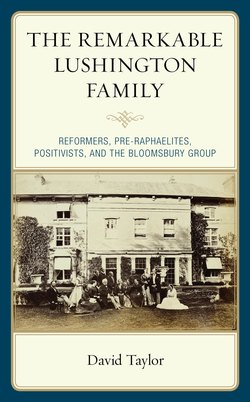Читать книгу The Remarkable Lushington Family - David Taylor - Страница 11
На сайте Литреса книга снята с продажи.
ОглавлениеIntroduction
What has been termed as “the long nineteenth century” (1798–1914) was marked by revolution and radical reform—aesthetically, politically, sexually, and culturally.1 During the course of that century, there emerged a new group within English society defined not by wealth, power, or social standing but by intellect. This group consisted of certain families who “began to share the spoils of the professional and academic world between their children.”2 The children of these families intermarried and drew others into their circle who were also distinguished by their intellectual ability.
Later defined as the “intellectual aristocracy,” this group had a profound influence on English politics, education, and literature and the family connections between them have been described as part of “the poetry of history.”3 Members of these families became the new professional civil servants. They were leaders of the intelligentsia “criticising the assumptions of the ruling classes above them and forming the opinions of the upper middle class to which they belonged.” They were marked by a sense of dedication, duty, and purpose. Franchise reform, women’s education, and reform of the universities were high on their agenda. Philanthropy and a sense of public duty was the magnet which drew them together.
The three generations of the Lushington family covered by this book were at this heart of this group not just as contributors but also as facilitators and networkers. An alternative title for this book could have been From Clapham to Bloomsbury. The Clapham Sect were a group of Church of England social reformers based in south London early in the nineteenth century whose adherents included the abolitionist William Wilberforce. The Bloomsbury Group were a colorful and highly influential group of English writers, intellectuals, philosophers, and artists at the start of the following century that included the writer Virginia Woolf and her sister, the artist Vanessa Bell. Where the Clapham Sect inspired a moral and spiritual reformation, the artists and writers of the Bloomsbury Group sought to effect a moral and spiritual liberation from those “Clapham values.”
The lives of the individuals featured in this book conveniently cover the period of the long nineteenth century and extend well into the twentieth. Stephen Lushington, who was born just before the French Revolution, was closely associated with and deeply influenced by the core values of the Clapham Sect. Nearly a century later, his three granddaughters spent their early years with Woolf and Bell, and others within the Bloomsbury Group. However, none of these Lushingtons felt able to enter those worlds which, nevertheless, touched, and in a measure, shaped their lives. Nor was Vernon Lushington, who represents the middle generation, entirely able to identify with another radical group, the early Christian Socialists, with whom he came into close with as a Cambridge undergraduate. Instead, the Lushington family generally tolerated a wide variety of religious beliefs or no belief at all.
It has been said that wherever social conscience and reform needed to be stirred into action, a Lushington could usually be found. Like others within the “intellectual aristocracy,” the Lushingtons married into families who shared their interests and political views—the Carrs, the Mowatts, the Massingberds, and the Maxses. But although the name Lushington can be found in the accounts of the lives of many of the well-known figures of the nineteenth century: writers, artists, musicians, politicians, and social reformers, it is usually there only as a footnote leaving the reader wanting to know more.
Except for a volume on Stephen Lushington’s political and legal career,4 and a privately printed early history of the Lushington family,5 no biography of any of the family has been published. This book seeks to redress the situation by bringing to the center stage of the social, artistic, and political life of nineteenth-century Britain the three generations of this remarkable family whose lives were interwoven with those of so many well-known and truly eminent Victorians, and whose own lives uniquely contributed to the cultural, spiritual, and political world in which they lived.
NOTES
1. “The long nineteenth century” was coined by the Marxist historian and author Eric Hobsbawm.
2. Noel Annan, “The Intellectual Aristocracy,” in Studies in Social History, ed. J.H. Plumb (Longmans, 1955).
3. Ibid.
4. S.M. Waddams, Law, Politics and the Church of England: The Career of Stephen Lushington 1782–1873 (Cambridge University Press, 1992).
5. Sir John Lushington Bt., From Gavelkinders to Gentlemen: A History of the Lushington Family in East Kent from 1200 to 1700 (Published by the author, 2011).
